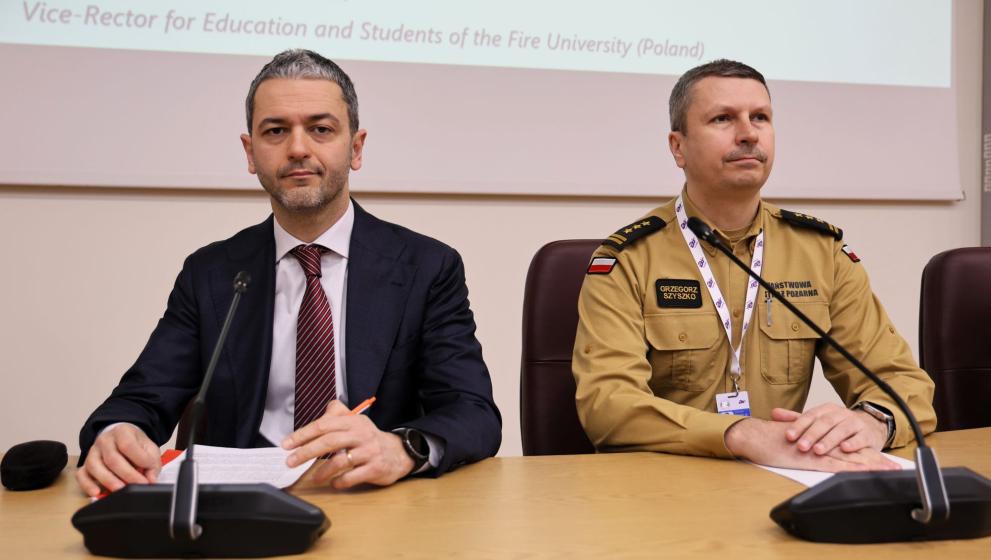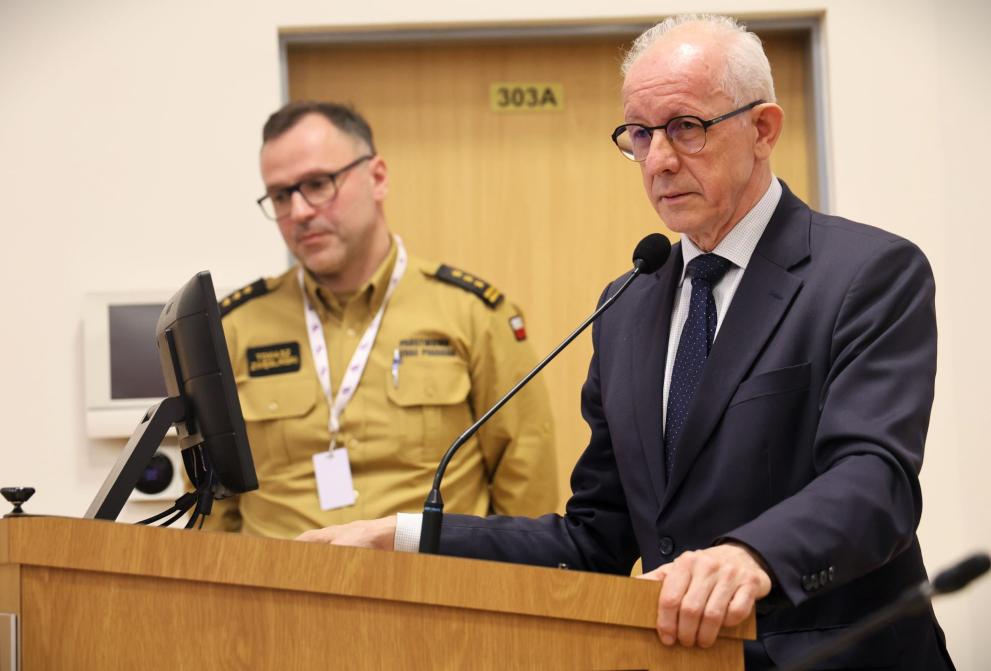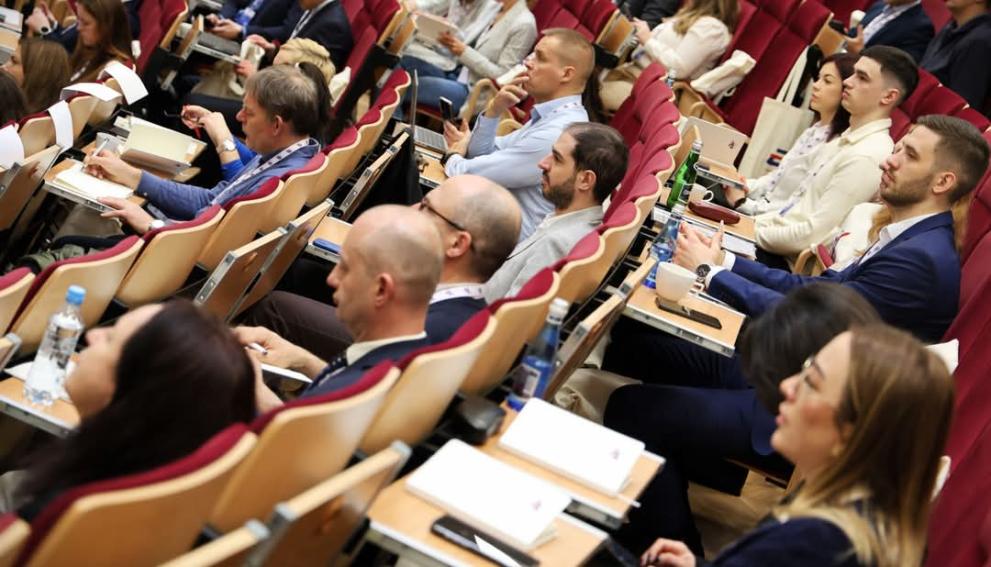
Civil Protection Capacity Building tools and EU Funding Opportunities
Workshop held in Warsaw on 25-26 March 2025,
under the framework of the Polish Presidency of the Council of the European Union.

The Fire University of Poland hosted a workshop on Civil Protection Capacity Building tools and EU funding opportunities, on 25 and 26 March 2025.
Under the framework of the Polish Presidency of the Council of the European Union, the workshop was co-organised by the European Commission, Directorate-General for Civil Protection and Humanitarian Aid Operations (DG ECHO), the Fire University of Poland and the Polish State Fire Service. It brought together some 70 representatives from the national civil protection (CP) authorities of 30 European countries, representatives of the EU institutions, the European Investment Bank (EIB), the World Bank, Committee of the Regions, European Court of Auditors, the Council of the Baltic Sea States Secretariat, the Polish Ministry of Development Funds and Regional Policy, and several Polish regions.

Mr. Wiesław Leśniakiewicz, Undersecretary of State at the Ministry of the Interior and Administration addressed participants underlining the importance for Europe of further developing citizen preparedness to deal with disasters and crises.
The objectives of the event were to raise awareness among civil protection authorities about funding sources for investment in disaster prevention and preparedness, as well as to identify knowledge gaps, capacity issues, and institutional shortcomings that the Union Civil Protection Mechanism (UCPM) Capacity Building tools could help address.
The two-day event featured panel discussions enriched by Q&A sessions and interactive thematic discussions in small groups (World Café), facilitating the exchange of examples and new ideas for enhancing disaster risk management (DRM) financing and investment across Europe.

Main highlights included prioritising “no regrets” investments1 for Prevention and Preparedness (based on the “Economics for Prevention and Preparedness” study by DG ECHO/World Bank), such as Early Warning Systems, Emergency Preparedness and Response Systems, Public Awareness and Self Preparedness, Nature Based Solutions, Risk Informed Building Codes, Land Management and Resilient Infrastructure, Financial resilience.
Cohesion Policy funding opportunities for DRM investments were presented, including concrete cases from Member States, such as Poland. This country’s experience with the Odra-Visła flood protection project was also shared as an excellent example of blending various funding sources to effectively support these efforts. The European Investment Bank (EIB) plays a crucial role in facilitating financing of such investments, with significant funds allocated for climate and DRM, including post-disaster reconstruction. Another key aspect discussed was the EU research funding opportunities for DRM offered by the Horizon Europe programme. In this context, some of the UCPM funding tools can be instrumental in facilitating the transition of research innovations, from prototype to deployment.
Other EU funds, such as the Technical Support Instrument (TSI) were presented. This tool provides tailormade support to national, regional and local authorities in EU Member States to design and implement reforms (for instance, on CP capabilities, wildfire risk prevention, seismic risk, etc.). The workshop also highlighted the strong demand from regions for DRM and climate services. There are dedicated instruments addressing these authorities, such as the EU Mission on Climate change adaptation. One of the projects funded by this programme, CLIMAAX, offers ‘cascading funding’2 to enable regional climate risk assessments. Useful insights were also shared by the Council of the Baltic Sea States on concrete challenges and recommendations for multi-country consortia coordination.
Moreover, the workshop brought the opportunity to learn from the experience of different EU Member States (Poland, Czechia, and Italy) that presented concrete examples of DRM projects.
The event highlighted the important role of the UCPM in addressing some of the challenges identified. For instance, the UCPM is well-positioned to bridge knowledge gaps by connecting countries with different levels of experience in managing technical assistance and investment funds, enhancing the role of the UPC Knowledge Network Platform as a hub for disseminating DRM funding information and fostering dedicated discussions between CP and DRM stakeholders, etc. These actions would further enhance a long-term vision and investment strategies.
In addition, the UCPM capacity building tools presented were highly appreciated. In this regard, ideas for further improvement were shared. For instance, exploring options for expanding the use of tools like the Technical Assistance Financing Facility (TAFF) to simplify administrative burden, simplifying payment arrangements under the UCPM grants, and developing dedicated training and staff development initiatives, among others.

This workshop aligns with the launch of the EU Preparedness Union Strategy on 26 March, which builds on the principles of an integrated all-hazards approach, covering all natural and human-induced risks and threats, a whole-of-government approach, which brings together all relevant actors across all levels of government, and a whole-of-society approach, which fosters an inclusive culture of preparedness and resilience involving citizens, local communities and civil society, businesses and social partners as well as the scientific and academic communities.

The workshop also builds upon the results of the previous workshop on Boosting disaster risk management financing, held in Brussels in November 2024 and organised by DG ECHO.
The Warsaw event offered the opportunity to continue the conversations around the different EU funding instruments available for Civil Protection authorities and discuss some key steps to increase access to those resources.
1 "No regrets” investments are measures that provide benefits regardless of whether a disaster occurs. Enhancing climate resilience involves managing existing climate risks and planning for long term climate change. No and low regrets investment options reduce vulnerability to existing and future hazards, and perform well across a range of climate change scenarios. They can be implemented regardless of climate change uncertainty.
2 Cascade funding, also known as Financial Support for Third Parties (FSTP), is a Commission mechanism to distribute public funding in order to assist beneficiaries, such as start-ups, scale-ups, SME and/or mid-caps, in the uptake or development of digital innovation.

The Knowledge Network editorial team is here to share the news and stories of the Knowledge Network community. We'd love to hear your news, events and personal stories about your life in civil protection and disaster risk management. If you've got a story to share, please contact us.
Sectors
Thematic series